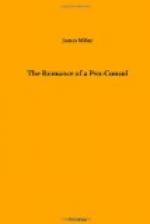XVII FOR ENGLAND’S SAKE
‘Suppose,’ urged Sir George Grey, ’that in my lifetime a hundred men have died from disappointment and chagrin—that is enough to condemn the whole system!’
He was speaking of Disraeli’s discovery, that the great colonial Governorships should go to those who had been ‘born in the purple’ or had married into it. It was, in a way, a matter personal to him, because the plan came into operation about the date his Pro-Consulship ceased. He felt that possibly it influenced the manner of his going, and, if so, that a wrong was done him as an individual. But he was merely bringing out his attitude to the system itself.
’I thought it was bad for everybody. In effect, it shut the field against simple merit; anyhow, discouraged it. A person might have all the qualities for a Governorship, except part and parcel in the peerage. On the other hand, it was injurious to the Colonies, because it set up men on an eminence, not for sheer merit, but because they happened to be born to rank. How did Napoleon Bonaparte make his army? By opening the very highest places to whoever could best fill them.’
Governor or no Governor, Sir George Grey must still work for his ideas and ideals, and after a little he hied him to England. Thinking, perhaps, that it had been abrupt with him, Downing Street was affable and kindly. But he was never, no matter how British Governments came or went, to be more employed. South Africa yearned for a strong pilot, and he was ready to step aboard. ‘I even asked,’ he said, ’to be sent back there, the one occasion on which I ever asked for anything, but without result.’
Disraeli offered to find him a seat in Parliament, perhaps as a sort of balm for wounded feelings. ‘I put that meaning on the offer,’ Sir George remarked, ’and really it was very good-natured on Disraeli’s part. It was so, all the more, when I remembered our contest over the affair of the Kaffir chiefs and their allowance. You see, I rather had the best of that, and his friends chaffed him about it.’ Sir George was his own political party all through life, so far as he was a politician at all. Disraeli asked no pledges, but, as Sir George observed, ’We were far divided in our views, and I should have been in revolt almost before I had taken my seat. Therefore I declined with thanks.’
Meanwhile, being free of official shackles, he hurled himself against the movement, rampant in England, to throw off the Colonies. He was Pro-Consul at large, under warrant of a duty for which he held himself accountable to the English-speaking people. He doubted whether he was not, thus, doing even better work, than he would have found to his hand as an employed Governor. There rang from end to end of the country a shriek of dismemberment: ’Cut the painter, chop off the Colonies, they are a burden to us; we should confine ourselves to ourselves!’




